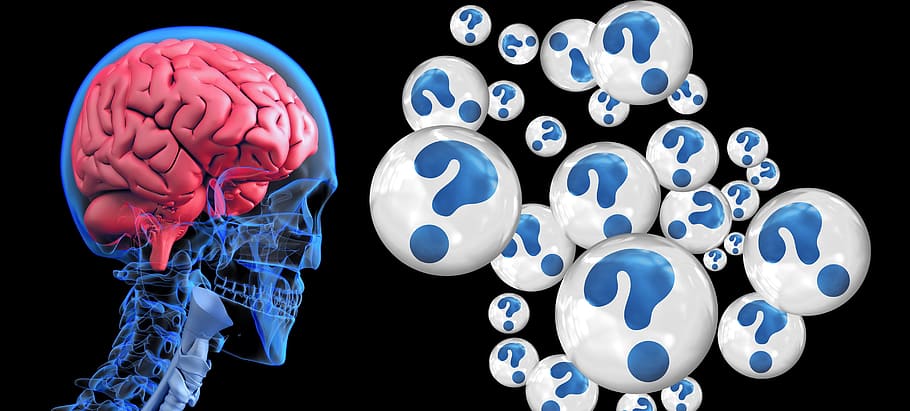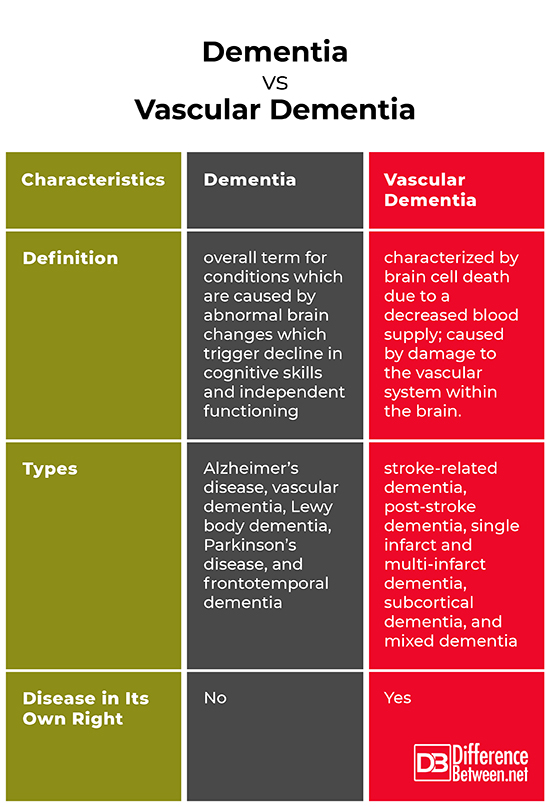Difference Between Dementia and Vascular Dementia
Dementia and vascular dementia are characterized by a progressive decline of cognition and independent functioning. Regarding their differences, dementia is an overall term for conditions which are caused by abnormal brain changes. On the other hand, vascular dementia is widely regarded as the second most common type of dementia after Alzheimer’s disease. The following discussions further delve into these distinctions.

What is Dementia?
Dementia came from the Latin word “demens” which means “out of one’s mind”. It is an overall term for conditions caused by abnormal brain changes which trigger decline in cognitive skills and independent functioning. It is generally due to brain cells’ damage which disrupts neuronal communication. Thus, patients’ thinking, feeling, and behaving processes are affected. Some of the common symptoms include short-term memory problems, frequently forgetting appointments, wandering out of the neighborhood, and difficulties with keeping track of one’s wallet, meals, and bills (Alzheimer’s Association, 2020).
The following are the stages of dementia (Leonard, 2018):
- Mild Cognitive Impairment
This is characterized by short-term memory problems and difficulties in planning and other complex mental tasks. Individuals with mild cognitive impairment may not progress to dementia.
- Mild Dementia
The symptoms of mild dementia include short-term memory lapses, personality changes, misplacing things, difficulties with complex tasks, and struggling to express ideas.
- Moderate Dementia
Those with this condition may present with poor judgment, more frequent memory loss, personality changes, needing help with selfcare, and increased confusion.
- Severe Dementia
The symptoms for severe dementia include inability to communicate, difficulties in maintaining bodily functions (walking, swallowing, bladder control, etc.), and increased risk for infections.
The following are some of the most common types of dementia (Leonard, 2018):
- Alzheimer’s Disease
This is the most common type of dementia (60% to 80% of cases). The memory loss in this condition worsens overtime and the symptoms usually appear in the mid-60s.
- Vascular Dementia
This is the second most common type of dementia; it is due to reduced blood flow in the brain.
- Lewy Body Dementia (LBD)
This is the third most common type and it is due to the buildup of Lewy bodies which are spherical masses of protein that develop inside nerve cells.
- Parkinson’s Disease
Patients with advanced Parkinson’s disease may develop dementia which is evidenced by difficulties in reasoning and decision making; other symptoms may include paranoia, irritability, and depression.
- Frontotemporal Dementia
The conditions under this term are associated with changes in the side and front parts of the brain. The general symptoms include loss of inhibitions and problems with language and behavior.

What is Vascular Dementia?
Vascular dementia is characterized by brain cell death due to a decreased blood supply. This second most common type of dementia is caused by damage to the vascular system within the brain. The early and middle stage cognitive symptoms include difficulties with judgement, problem solving, planning, following procedures, recalling recent events, fluency, and visuospatial skills. Patients may also experience mood swings, depression, anxiety, and/or apathy. The late stage symptoms include more severe disorientation, communication problems, memory loss, irritability, disturbed sleep pattern, agitation, and/or aggressive behavior. Some patients may also present with delusions, hallucinations, and difficulties with walking and eating.
The following are the different types of vascular dementia (Alzheimer’s Society, 2020):
- Stroke-related Dementia
This occurs when the blood supply to a brain part is suddenly blocked, usually by a clot. The severity depends on the temporary or permanent interruption of blood flow.
- Post-stroke Dementia
Around 20% of major stroke patients develop post-stroke dementia; a large volume of brain tissue wastes away due to the lack of oxygen.
- Single-infarct and Multi-infarct Dementia
This is caused by a single or several smaller strokes. A small area of brain tissue is affected since the blood flow interruption only lasted for a few minutes.
- Subcortical Dementia
This is due to the diseases of the very small blood vessels situated deep in the brain. The blood flow is reduced when the vessels’ walls become stiff and twisted.
- Mixed Dementia
This condition is caused by both Alzheimer’s disease and vascular disease.
Difference between Dementia and Vascular Dementia
Definition
Dementia is an overall term for conditions which are caused by abnormal brain changes which trigger decline in cognitive skills and independent functioning. In comparison, vascular dementia is characterized by brain cell death due to a decreased blood supply. This second most common type of dementia is caused by damage to the vascular system within the brain.
Types
The types of dementia include Alzheimer’s disease, vascular dementia, Lewy body dementia, Parkinson’s disease, and frontotemporal dementia. On the other hand, the types of vascular dementia include stroke-related dementia, post-stroke dementia, single infarct and multi-infarct dementia, subcortical dementia, and mixed dementia.
Disease in Its Own Right
Dementia is an umbrella term for a group of symptoms and it is not really a disease in its own right (Alzheimer’s Society, 2020). As for vascular dementia, it is the second most common disease under dementia.
Dementia vs Vascular Dementia

Summary
- Dementia came from the Latin word “demens” which means “out of one’s mind”.
- Vascular dementia is characterized by brain cell death due to a decreased blood supply.
- Dementia is an overall term for conditions which are caused by abnormal brain changes while vascular dementia is the second most common type of dementia which is caused by damage to the vascular system within the brain.
- The types of dementia include Alzheimer’s disease, vascular dementia, Lewy body dementia, and frontotemporal dementia while those of vascular dementia include stroke-related dementia, post-stroke dementia, and mixed dementia.
- Difference Between Hematoma and Melanoma - February 9, 2023
- Difference Between Bruising and Necrosis - February 8, 2023
- Difference Between Brain Hematoma and Brain Hemorrhage - February 8, 2023
Search DifferenceBetween.net :
Leave a Response
References :
[0]Alzheimer’s Association. Types of Dementia. 2020. https://www.alz.org/alzheimers-dementia/what-is-dementia/types-of-dementia
[1]Alzheimer’s Association. Vascular Dementia. 2020. https://www.alz.org/alzheimers-dementia/what-is-dementia/types-of-dementia/vascular-dementia
[2]Alzheimer’s Society. About Dementia. 2020. https://www.alzheimers.org.uk/blog/what-difference-between-dementia-and-alzheimers-disease
[3]Alzheimer’s Society. Vascular Dementia. 2020. https://www.alzheimers.org.uk/about-dementia/types-dementia/vascular-dementia#content-start
[4]Leonard, Wendy. What Do You Want to Know About Dementia? 2018. https://www.healthline.com/health/dementia
[5]Image credit: https://c1.wallpaperflare.com/preview/63/895/831/brain-question-mark-alzheimer-s-dementia.jpg
[6]Image credit: https://www.picpedia.org/handwriting/images/dementia.jpg
